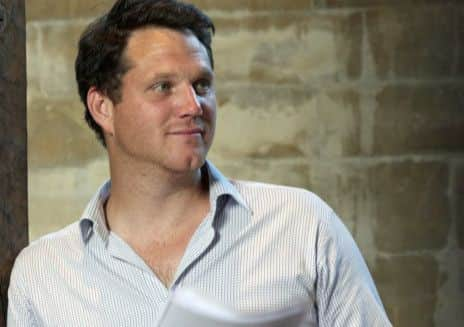The Big Interview: Alan Lane


One of the most important things about Alan Lane’s story is also the least important.
As a young man, Lane beat cancer.
“Cancer survivor” is a label you will always wear once you are one, but you will struggle to find anyone less willing to be wear it than Lane. For the most part, it’s hidden beneath his various other titles.


Advertisement
Hide AdAdvertisement
Hide AdTheatre director, lecturer, leader, public speaker, inspirer of people – which sounds like an odd one, but wait til you hear the full story.
Lane should be exhausted, when we catch up on the phone. We’d met a couple of weeks earlier, but as he was deep into his next project, I wanted to have another chat to find out how it was going.
Normally based in Leeds, he and his team have decamped to York for two months for the latest venture. Lane is buzzing with energy... Lane is always buzzing with energy, but he appears particularly effervescent tonight because he has just knocked off early. Early for Lane means it was only a 14-hour working day.
How does he find the energy?
“You’re a long time dead.”
It’s a phrase that lots of busy people use, a mantra to repeat when people ask how the pace is kept up. When Lane says it, there’s a weight behind the sentence. While he hasn’t allowed himself to be defined by cancer, it does seem to drive him to fill every waking minute.
Advertisement
Hide AdAdvertisement
Hide AdIt was 2000 when he was diagnosed with Hodgkin’s lymphoma. It was treatable.
All the doctors needed to do was completely destroy his body’s ability to protect itself from any kind of infection and put him in a sealed room for nine weeks. And he was told he would have a 50 per cent chance of surviving.
“It was literally a sealed room and one wall was a window, it was like a fish tank,” he says. “They give you so much chemotherapy that your body has literally no way of protecting itself from any infection and then slowly build your bone marrow back. You spend nine weeks on your own, in this room with a glass wall and all you have the energy to do is look at the ceiling. Your body is so destroyed that an inch to the left or right and you’ll die.
“And it wasn’t just me – there were lots of other young men in the same position and I saw some of them go in there with the right attitude and I saw some of them go in there with the wrong attitude – and there is absolutely no shame in that – but the ones who came out were the ones who went in with the right attitude.”
Advertisement
Hide AdAdvertisement
Hide AdIt is impossible not to be moved by Lane’s candid description of the two years he spent fighting the disease which was diagnosed on his 22nd birthday, but it’s what he did with the experience which is the really significant bit.
“I was on the top floor of Royal Hallmshire Hospital and you are assigned a therapist when you are having the treatment I was having. I got a brilliant, brilliant man and he explained it very simply,” says Lane. “He said that those nine weeks I had to spend in the glass room, recovering, were going to feel like a lifetime. The seconds would be like minutes, the minutes like hours and nine weeks you can barely wrap your head around. It is the closest I have ever come to hell.
“And my brilliant therapist told me something that helped me through. He said it would be hell, but that one day it would become a story and it would be a story that I could tell in five minutes.
“That nine weeks would one day be shrunk to just five minutes.
“And he was right.”
Advertisement
Hide AdAdvertisement
Hide AdLane emerged from his personal hell, that room with a window for a wall in a Sheffield hospital, an entirely changed man. For one thing, he now believed passionately in the power of stories; he also had a determination that not a moment of his life would be wasted.
“Stories aren’t an abstract thing, they’re real and they can help people and we should all look to our own stories. At the end of the month when you balance up your finances, you should also be balancing up your stories and taking account,” says Lane. “And we should all have stories.
“Another brilliant thing that therapist did was come in one day with the tickets he’d bought to see Kenneth Branagh in Richard III at the Sheffield Crucible. He waved them in front of me, taunting me. I was gutted. He just laughed and said that I should get better and I’d be able to go see the show. That kind of aggressive attitude galvanised me and now – it’s a case of if there is a wall in the way, we shall go through the wall – and leave a bloody big Alan-shaped hole in it.”
Lane went back to Sheffield University to finish off his studies with not just a new plan, but a mission. He hooked up with a group of other young people at Sheffield who also wanted to tell stories and they decided to tell them through theatre. The only thing they had in common was that none of them had any background in theatre, no family, nothing.
Advertisement
Hide AdAdvertisement
Hide Ad“Matthew David Scott’s, the other guy that set up the company, well his dad was a labourer, I come from a military background, none of us had any connection to theatre,” says Lane.
So why pursue it?
The answer to that lies in the work Lane has gone on to create.
The company Lane now leads is called Slung Low. The name was dreamt up on a whim when he was asked for a name.
“We were all kids and used to wear baggy jeans, so when we were asked our name one day, I just said ‘Slung Low’ and it stuck,” says Lane. “It sums up the fact that we’re not pretentious and we keep that same spirit we’ve always had.”
Advertisement
Hide AdAdvertisement
Hide AdIt took five years for Slung Low to get any good. At all. It also took five years to get paid for their work.
“There is definitely a link between those two,” says Lane.
In the meantime there were a number of jobs each member of the company took on to put food on the table. Lane wins the award for worst job, hands down: shovelling rotting meat out of a pork pie factory.
In 2005, the company finally cracked it. Their first success was a piece of theatre that Lane to this day doesn’t like describing as a “piece of theatre”.
“You ask someone to buy a ticket for a ‘durational, immersive, multi-narrative piece of theatre’ and you’ve got no chance. Ask them to come to a vampire adventure story and they are there.”
Advertisement
Hide AdAdvertisement
Hide AdThey Only Come at Night really was a vampire adventure story. See, what Slung Low do is make a kind of anti-theatre. Lane likes the description someone once gave – it is like being in a movie where you are the camera – so that first show took place in a Bradford multi-storey car park. It was thrilling and terrifying.
“Most people in this country think theatre is Julian Fellowes territory and Simon Callow doing (he puts on a plummy voice) ‘theatre’, but it is so much more grounded and real and important than that. How has that been turned into something irrelevant and elite? How have we allowed that to happen? When we make theatre we all, audience and performers, get in a space together and work stuff out. There is nothing irrelevant about that.”
Reckon you’ve got the level of this company? Think they make little fringe-pieces of work in places like Bradford car parks? Try a Singapore international arts festival. That’s where the final piece of the vampire adventure was staged last year, across a vast shopping centre. Try across the whole city of Hull in 2011 for a project called Mapping The City – which was funded as part of the Cultural Olympiad. Try Opera North, which has called on Lane on a number of occasions. Try Cast – when the new £22m Doncaster theatre opened, there was only one company they wanted to be in charge of the opening event – Slung Low.
And next month, try the city of York which will see what has to be the most ambitious project attempted by Slung Low to date. Blood + Chocolate is so big it is taking three separate theatre companies to make it. Slung Low is creating the piece and the producers behind it are Pilot Theatre Company and York Theatre Royal.
Advertisement
Hide AdAdvertisement
Hide AdIt is a story based on a special moment in York’s history when, during the First World War, the Rowntree factory designed and sent a chocolate tin to every soldier from York fighting at the front.
The concept was to take that moment and use it to inspire a piece of theatre that would take over the whole of the city.
Imagine something on the scale of the York Mystery Plays, but across a mile-wide stretch of York. That’s what Lane is creating. It is not without problems.
“The gas board dug up a massive part of our set today,” laughs Lane. “We have a spectacular team. That’s how we will make it work – and we have to. We have nearly 200 people in the cast and for them, this is the most important thing they will do all year. It will change the way the people who see it, see their city. It is massive and it is hard work and it is brilliant.
“And you’re a long time dead.”
Blood and Chocolate, York, October 3 to 20. 01904 623568, www.pilot-theatre.com